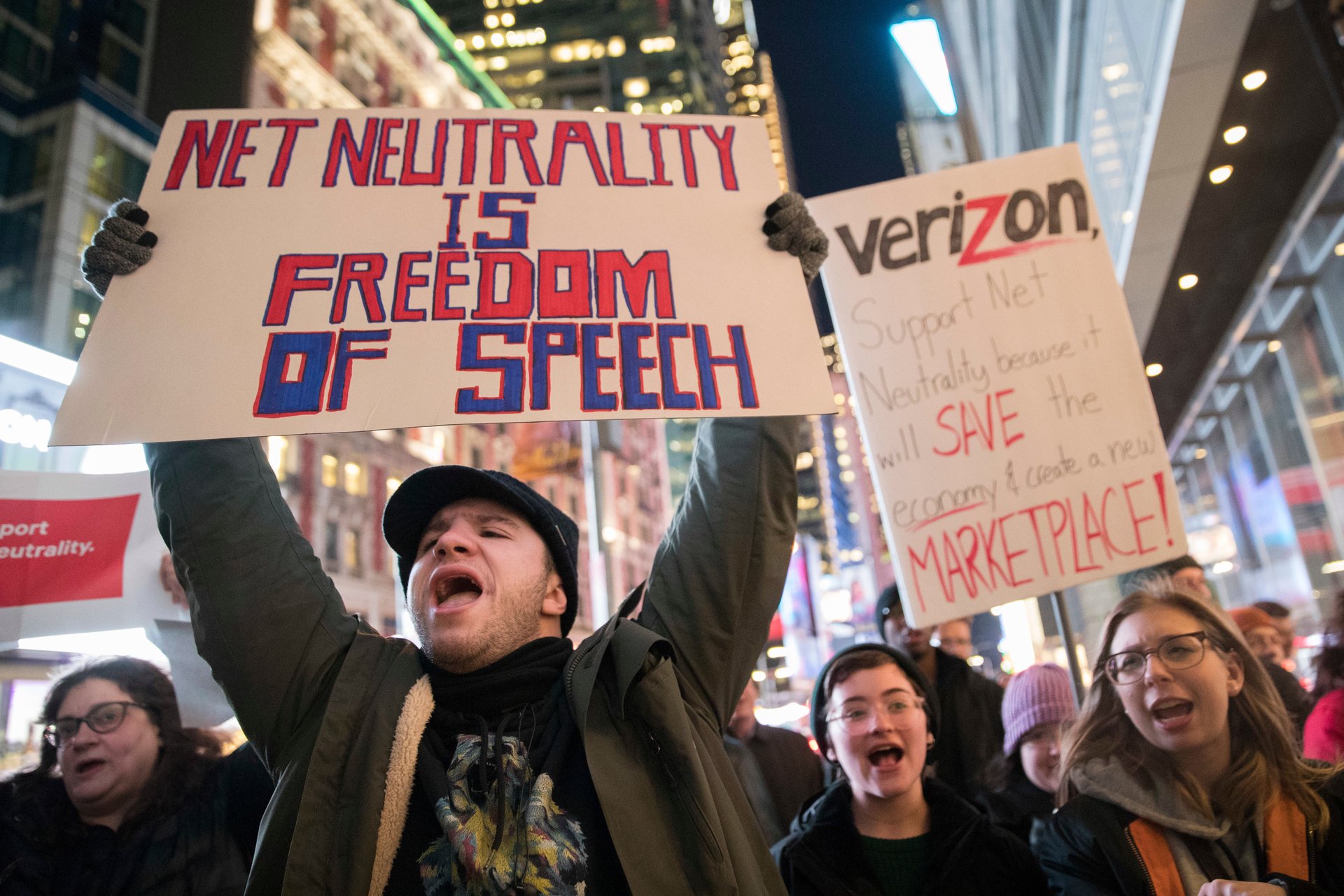California’s net neutrality law is broadband companies’ worst nightmare
In 2017, the broadband industry appeared to win its battle against net neutrality. Under the Trump administration, the US Federal Communications Commission (FCC) rolled back rules that barred internet service providers from blocking or slowing down traffic to certain websites or charging some sites a fee for preferential treatment. Net neutrality was, effectively, dead.


In 2017, the broadband industry appeared to win its battle against net neutrality. Under the Trump administration, the US Federal Communications Commission (FCC) rolled back rules that barred internet service providers from blocking or slowing down traffic to certain websites or charging some sites a fee for preferential treatment. Net neutrality was, effectively, dead.
But the regulatory change turned out to be a Pyrrhic victory for telecom companies. The FCC’s decision opened the door for states to pass their own laws managing the internet. On Feb. 23, a federal judge paved the way for California to do just that: The state can now implement its 2018 net neutrality law, which reinstates all the former FCC net neutrality rules within California.
For the telecoms, the trouble started the moment they won their fight before the FCC in 2017. The industry didn’t just get the agency to repeal its net neutrality rules—it convinced the FCC to rule that it never had the authority to create net neutrality regulations in the first place. That left the agency powerless to stop states from filling in the vacuum with their own legislation. When the FCC tried to overrule the states’ laws, the Washington DC court of appeals declared that if the agency had no power to make net neutrality rules, it also had no power to invalidate state’s rules.
As a result, internet service providers are facing a worst-case scenario. California and six other states have passed laws that require broadband companies to comply with net neutrality restrictions in much of the country. Nine more states introduced net neutrality bills this year. And now the companies also have to contend with a patchwork of inconsistent regulations that vary from state to state.
The industry isn’t happy about it. “A state-by-state approach to Internet regulation will confuse consumers and deter innovation, just as the importance of broadband for all has never been more apparent,” read a statement from a coalition of industry groups.
The companies have only themselves to blame, says Ryan Singel, a fellow at Stanford Law School’s Center for Internet and Society. “They absolutely made this bed for themselves,” he said.
Singel said California’s law—and its legal victory this week—will likely spawn copycat bills in other states. “The stakes of passing your own version of the California net neutrality law have gone down significantly,” he said. “It’s a pretty clear message to other states that they are legally in the clear.”
While California wields outsize regulatory power (its rules on auto emissions and fuel efficiency have been adopted by 13 other states), the state’s net neutrality law won’t immediately change standards all across the country, says Christopher Sprigman, a law professor at New York University. In the vehicle market, automakers must adhere to the strictest environmental standards because it’s prohibitively expensive to design and manufacture different versions of the same car to sell in every US state.
Telecoms, on the other hand, have the power to throttle internet service in one state and not another, according to the state’s regulations.
But just because it’s technically possible, doesn’t mean it’s not a big headache. “State law compliance is a cost of doing business and they do it all the time,” wrote University of Virginia law professor Thomas Nachbar by email. “The problem, though, is that, in order to make these rules effective, many of them would reach beyond the state.”
Nachbar gave the example of a California net neutrality law that affects an internet service provider’s data center in Utah. Would it be illegal for that broadband company to speed up or slow down traffic between its national internet backbone and the Utah data center? “If the parties in Utah are required to comply with California law, that effectively makes California Utah’s (and the rest of the country’s) Internet regulator,” Nachbar wrote. “But it really depends on what the different state statutes require (and there are several of them).”
The law’s biggest impact may be its ability to refocus attention on an issue that in recent months has faded from popular attention. Net neutrality remains broadly popular among Democrats and Republicans alike. The episode could pressure Congress to pass legislation enshrining net neutrality at the national level, or give the FCC political cover to re-reverse itself and bring back its original rules. “I think this will shape the public’s expectations,” said Sprigman. “People in other states might start to wonder why California is getting a better deal than they are.”